In an exclusive interview with Drop Site News, a senior Hamas official said that the group intends to uphold its side of the “ceasefire” deal—despite claims by Israeli Prime Minister Benjamin Netanyahu that he received assurances from both President Joe Biden and President-elect Donald Trump that Israel can resume its war against Gaza after the first phase of the agreement.
“We are committed to this deal. We will exert the maximum efforts to give this deal a chance to succeed. We are looking for how to prevent the war again, how to protect our people. We will do the best to protect this deal,” said Dr. Basem Naim, a member of Hamas’s political bureau. “What kind of side deals they have done, this is their business. But what I can say here: the American administration led by Biden, we consider complicit—directly complicit—in the genocide.”
In his speech announcing Israel’s acceptance of the deal late Saturday night, Netanyahu portrayed the agreement as a temporary one. “Both President Trump and President Biden have given full backing to Israel's right to return to the fighting if Israel reaches the conclusion that the second stage negotiations are ineffectual. I greatly appreciate this,” he said. “I also greatly appreciate President Trump's decision to lift the remaining restrictions on providing vital weapons and munitions to the State of Israel. If we need to go back to the fighting, we will do so in new ways and with great force.”
Naim said that Hamas’s armed wing, the Qassam Brigades, as well as other resistance groups, are prepared to resume fighting if Israel violates the agreement and continues its military attacks on the Gaza Strip. “We are not looking for a fight,” Naim said. “We are looking [at] how to protect the future of our children. If we can reach this politically or diplomatically or legally, yes, this is preferable. But if not, I think all Palestinians are still ready to continue this struggle. We believe that this is a just cause, a just struggle and we have all the guaranteed right by the international law to resist the occupation by all means, including armed resistance. What we are looking for is an independent state. If we can get it politically or through a UN Security Council resolution, this is the preferable way.”
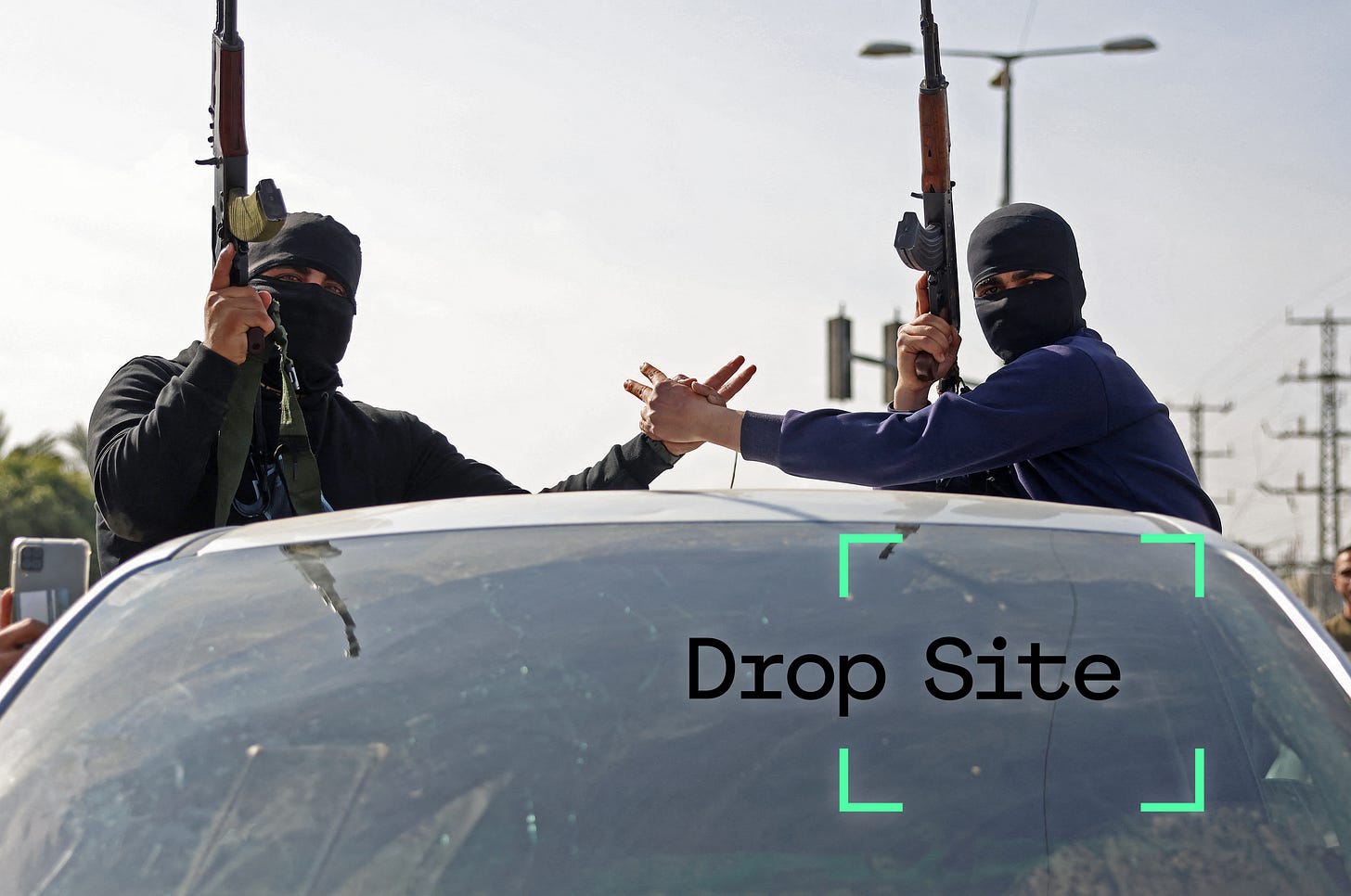
Early Sunday morning, the Israeli government accused Hamas of delaying implementation of the ceasefire, which was scheduled to go into effect at 8:30 a.m. local time, saying the group had failed to hand over to Israel the names of the first three Israeli captives held in Gaza that would be released. Israel continued to attack Gaza throughout the morning. Eventually, Hamas handed the names of the three Israeli women it would release: Romi Gonen, Emily Damari, and Doron Steinbrecher. Naim said the delay was due to the ongoing Israeli attacks, which made coordination with Hamas’s forces inside Gaza difficult. According to the Israeli military, the women were transferred to the Red Cross in Gaza City’s Saraya Square shortly after 5pm local time. An Israeli official told Reuters the women were “in good health.”
Naim accused Israel of violating an agreement to cease its attacks on Gaza for 72 hours leading up to the first exchange of captives. “There was an agreement to give the parties 72 hours of calm without bombardment, without shooting, so that the people on the ground can prepare themselves and rearrange themselves, redeploy themselves and prepare the names and the captured Israelis who will be handed on the first day. This was agreed upon and accepted,” Naim said. “The Israelis in the government, they continued to discuss the agreement in their government and they didn't announce an official acceptance of the agreement until yesterday evening, which means that between their official acceptance and the starting of the implementation of the deal was only around 12 hours. Therefore it was not possible technically to hand over the names in the first hour. Netanyahu said, ‘Look, Hamas is delaying the deal. Hamas is spoiling, sabotaging the deal.’ It is not Hamas. We have agreed upon 72 hours. What they have given us is only two hours. You can imagine all this destruction, all the dangers. They have shot people even a few hours after the start of the ceasefire agreement.”
Once the names of the Israeli captives were handed over to mediators and Israel confirmed receipt, Israel announced the ceasefire would go into effect at 11:15 a.m. local time. At least 19 Palestinians were killed after the ceasefire was scheduled to take hold Sunday, according to Mahmoud Basal, the spokesperson for Gaza’s Civil Defense team. After the deal was officially announced on Wednesday evening, Israel escalated its bombing campaign across Gaza, killing more than 120 Palestinians, including 33 children. Many more are believed to be dead, but their bodies are still trapped under rubble.
“The occupation intensified its bombing in the first hours after the ceasefire was announced. Fifty airstrikes in less than 24 hours. They targeted shelters, homes, and tents of the displaced. More destruction, more blood,” Palestinian journalist Hossam Shabat wrote in a dispatch for Drop Site from Gaza City on Saturday night. “They targeted the al-Falah school; they bombed an entire residential block in Jabaliya; they killed families, like the Alloush family, whose bodies have not yet been recovered and still lie under and over the rubble. The children I saw that night appeared happy but they were no longer living, their faces frozen in a mix of smiles and blood.”
On Sunday morning after the temporary ceasefire officially went into effect, Palestinians in Gaza posted videos of uniformed Palestinian police returning to the streets. The Government Media Office in Gaza said thousands of Palestinian police officers have begun deploying in the streets “as part of a government plan to maintain security and order across various governorates.”
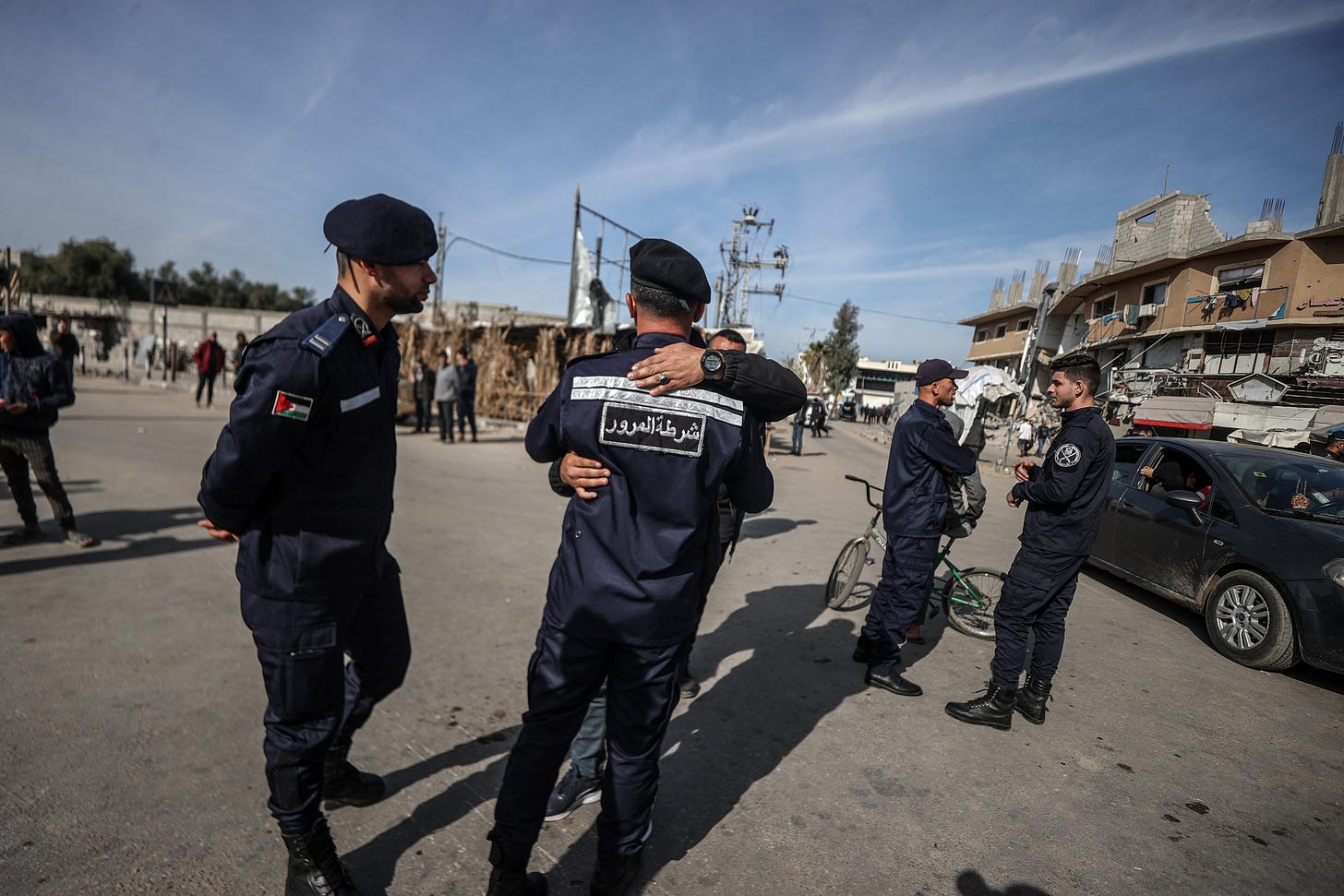
Armed resistance fighters also drove through streets amid celebratory gunfire. In Deir al-Balah, in central Gaza, Drop Site correspondent Abubaker Abed reported that many people who were forcibly displaced into tent encampments had begun packing their belongings to begin the journey back to their own neighborhoods and cities. Many Palestinians are beginning a painful search for missing loved ones.
Israel is supposed to release 95 Palestinians on Sunday. According to the Israeli military, its special units would receive the three Israeli women from the Red Cross inside the Gaza Strip. The Israel Prison Service said in a statement on Friday that Israeli authorities, not the Red Cross, will transport Palestinian prisoners released as part of the deal to ensure “the terrorists do not deviate from the strict security guidelines and refrain from any expression of joy within Israeli territory.” Israeli forces have conducted multiple raids of the homes of Palestinians set to be freed, warning their families not to engage in public celebrations.
Under the terms of the three-phase agreement, Hamas will release 33 Israelis held in Gaza in the first phase, which lasts six weeks, in exchange for more than 1,900 Palestinians held in Israeli prisons and other facilities, including a significant number of women and children. Among the Palestinians slated for release in the first phase are 110 Palestinians serving life sentences.
Israel currently holds more than 10,400 Palestinians, including 320 children, arrested in the occupied West Bank and East Jerusalem in its prisons and other facilities. according to Palestinian prisoner rights group Addameer. While the number of prisoners from Gaza is not verified, Israeli authorities recently said they numbered 3,400 in response to a court filing. Israeli officials have said an estimated 1,000 Palestinians snatched in Gaza are being used as bargaining chips in the exchange deal.
Under the agreement, technical negotiations are set to begin on further exchange of captives as well as the pull back of Israeli forces from the Gaza Strip no later than 16 days from now. The second phase—which Netanyahu indicated may never be implemented—envisions a permanent ceasefire and the complete withdrawal of Israeli forces. The third phase involves reconstruction in Gaza and the establishment of an authority to govern the Strip.
In Doha on Saturday night, Hamas hosted a meeting of several Palestinian factions, including Islamic Jihad, the Popular Front for the Liberation of Palestine, the National Initiative, and the Palestinian People's Party, to discuss the exchange of captives with Israel and the future of the Strip. Notably absent from the meeting were representatives of Mahmoud Abbas, the Palestinian Authority president, who has stated that his administration will assume “full responsibility” over Gaza.
Hamas’s Naim said that he considers the ceasefire agreement an achievement for the Palestinian resistance, in part because it did not result in a surrender by Hamas and other factions. “We cannot say that we have defeated Israel as a superpower in the region,” Naim added. “But also, at the same time, we can say that the resistance was so steadfast, so committed that Israel was not able to defeat it. I think this is a good starting point for the next stage where Palestinians have to struggle for their political project, which is an independent, self sovereign state.”
Naim said that while Trump played a significant role in the timing of the ceasefire agreement and putting pressure on Netanyahu to sign a deal before his inauguration, Hamas is aware of indications Trump intends to reward Israel, potentially through support for Israel officially annexing the West Bank or to move forward with a normalization agreement.
“President-elect Trump had said, ‘I want to see an end to this war before inauguration day.’ But on the other side, we are worried about what he has promised Netanyahu on the other side, maybe to annex most of the West Bank, to go for normalization with Arab countries, because this cannot be done without stopping the war in Gaza,” Naim said. “Maybe all this together has pushed Netanyahu to go for a deal. But I am sure, based on what I have seen today and yesterday, Netanyahu and his group are trying to find any excuses to spoil and to sabotage the deal in the coming days.”
Asked whether Hamas stands by its decision to attack Israel on October 7 in light of the horrifying toll Israel’s genocide has taken on the Palestinian people, Naim said he considered Operation Al Aqsa Flood a defensive action. “If you have to choose between how to die—to die by lacking medicine or lacking of food, or to die with an Israeli rocket—we have chosen to stand up fighting for our dignity and freedom, to protect the future of our children and to die by rocket instead of dying silently, peacefully by lack of medicine,” he said. “We are not ready to be good victims. We are not ready to be silenced by anyone.”





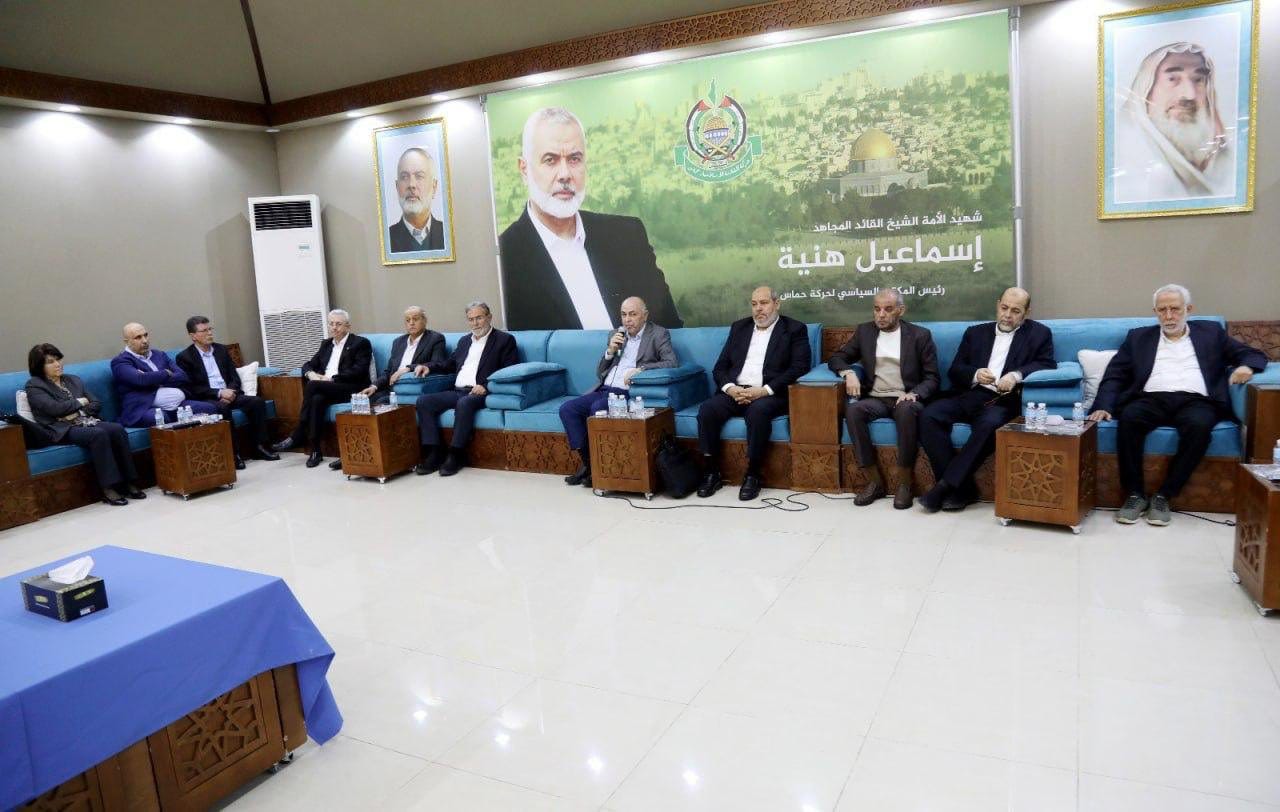

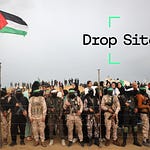

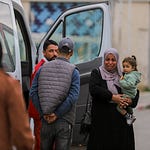
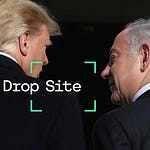

Share this post